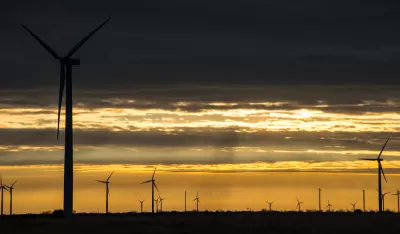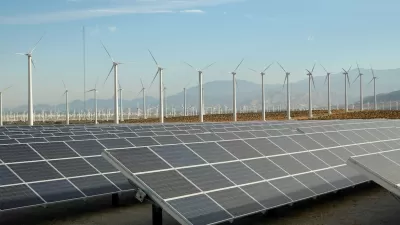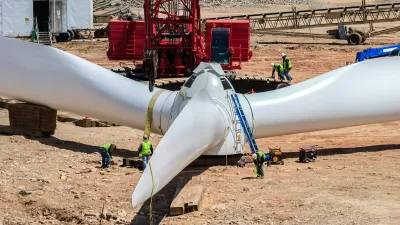The market is ready for carbon-neutral companies to redefine global reliance on natural gas. But not all clean energy producers are carbon-neutral.

In a short-lived, historic moment, NextEra Energy surpassed Exxon as America's most valuable energy company. NextEra's brief rise above the oil giant from early October through mid-November, "to be fair, was more a result of the turmoil oil majors have faced during the pandemic than any new moves by the Florida-based electric power provider. In mid-November, news of two promising Covid-19 vaccines buoyed fossil fuel share prices and dropped NextEra to its previous rank, with a current market capitalization just shy of $150 billion." writes Tim McDonnell, providing some context for the upset.
More than anything, says McDonnell, the symbolic meaning of the eclipse in the company's value signals a future in which "the climate change economy has anointed a new set of energy titans."
McDonnell's article traces the history of the power company from its beginnings as a Miami-based electricity company through a troubling environmental event involving leaked radioactive water into the Biscayne Bay, and into the Clinton-era Federal Energy Regulatory Commission (FERC) reforms and George W. Bush wind tax credits. The article also uncovers NextEra's reliance on natural gas
NextEra's reputation as a "hard-elbowed and deep-pocketed political player" continued in 2020 when "the company gave nearly $1.4 million—more than any other utility—to political action committees for congressional candidates (52% went to Republicans). Closer to home, a 2017 report by the watchdog group Integrity Florida detailed the revolving door between FPL and the Florida Public Service Commission (PSC), which regulates utilities," says McDonnell.
According to McDonnell, the momentary rise of NextEra shows that the market will support companies that work to shift away from carbon reliance. "Now, a century after its founding, NextEra needs to prove that it can keep its footing while it drops the crutch of natural gas—forging a business model that is both profitable and planet-friendly," McDonnell writes.
FULL STORY: How wind and solar toppled Exxon from its place as America’s top energy company

Alabama: Trump Terminates Settlements for Black Communities Harmed By Raw Sewage
Trump deemed the landmark civil rights agreement “illegal DEI and environmental justice policy.”

Study: Maui’s Plan to Convert Vacation Rentals to Long-Term Housing Could Cause Nearly $1 Billion Economic Loss
The plan would reduce visitor accommodation by 25% resulting in 1,900 jobs lost.

Planetizen Federal Action Tracker
A weekly monitor of how Trump’s orders and actions are impacting planners and planning in America.

This Toronto Suburb Has More Bus Riders Than Columbus, Ohio
Brampton, Ontario used gradual improvements in service to prove that if you build it, they will ride.

Paris Bike Boom Leads to Steep Drop in Air Pollution
The French city’s air quality has improved dramatically in the past 20 years, coinciding with a growth in cycling.

Why Housing Costs More to Build in California Than in Texas
Hard costs like labor and materials combined with ‘soft’ costs such as permitting make building in the San Francisco Bay Area almost three times as costly as in Texas cities.
Urban Design for Planners 1: Software Tools
This six-course series explores essential urban design concepts using open source software and equips planners with the tools they need to participate fully in the urban design process.
Planning for Universal Design
Learn the tools for implementing Universal Design in planning regulations.
Smith Gee Studio
Alamo Area Metropolitan Planning Organization
City of Santa Clarita
Institute for Housing and Urban Development Studies (IHS)
City of Grandview
Harvard GSD Executive Education
Toledo-Lucas County Plan Commissions
Salt Lake City
NYU Wagner Graduate School of Public Service





























